8 Africa
Africa, a continent with immense potential owing to its rich natural resources and its large population of approximately 1.3 billion, is, in recent years, however, facing various challenges including decline in global commodity prices, fragile health systems, and emerging terrorism and violent extremism threats. In order to tackle these challenges, the international community has started to closely support Africa’s own efforts, such as Agenda 2063, a new development agenda for Africa by itself, adopted at the African Union (AU) Summit in 2015, as well as the 2030 Agenda for Sustainable Development, newly adopted at the UN in the same year.
●Japan’s Efforts
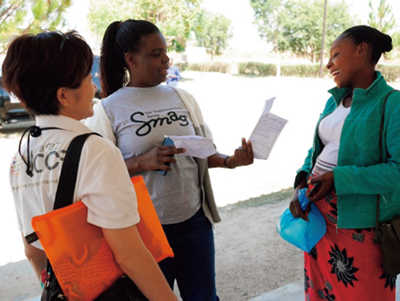
A personnel and local staff of the Japanese Organization for International Cooperation in Family Planning (JOICFP), an NGO, conducting a hearing on pre-natal examinations of expectant mothers as part of the project for promoting women’s health in Zambia (Photo: JOICFP)
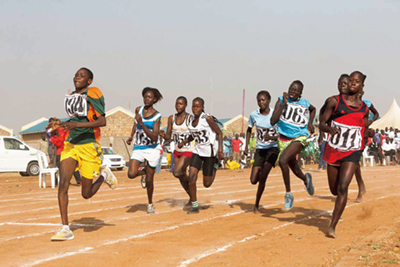
The 800 meter final of the women’s track and field at the 4th National Unity Day held in Juba, the capital of South Sudan, under the slogan “peace and social cohesion” with support from JICA (see “ODA Topics” for details) (January 2019) (Photo: JICA)
In partnership with the international community, Japan has co-organized the Tokyo International Conference on African Development (TICAD), as a framework to support Africa’s own initiatives mentioned above, together with the United Nations, the United Nations Development Programme (UNDP), the World Bank and the African Union Commission (AUC). At TICAD7 held in Yokohama in August 2019, participants held discussions on three main pillars, Economy, Society, and Peace and Stability, respectively. Japan will implement the following initiatives on the above-mentioned areas.
In regard to the first pillar, Economy, Japan will develop industrial human resources who will contribute to the promotion of businesses in Africa, including through the ABE Initiative 3.0. Japan has received over 1,200 people from Africa thus far through JICA since TICAD V. Moreover, Japan will also promote quality infrastructure investment centered on the three priority areas(Note10) toward strengthening connectivity.
As for the second pillar, Society, Japan will further promote measures toward the expansion of Universal Health Coverage (UHC), and build resilient health systems by improving access to basic healthcare and hygiene environments for three million people. Currently, Japan is implementing technical cooperation through the “Project for Improving Continuum of Care for Mothers and Children through the Introduction of Combined MCH Record Book” in Ghana, and the “Partnership for Health Systems Strengthening in Africa (PHSSA) Phase 2” in Kenya. In addition, Japan will provide quality education to three million children through the expansion of math and science education and improvement of learning environments.
Regarding the third pillar of Peace and Stability, Prime Minister Abe advocated the New Approach for Peace and Stability in Africa (NAPSA)* at TICAD7. Under NAPSA, Japan intends to support Africa-led efforts to resolve conflict, as well as assist institution-building to address the root causes of conflict and terrorism.
As a part of this initiative, Japan has provided support of approximately $100 million since 2008 to contribute to peace and stability in Africa through the TICAD process, which includes projects that have benefitted PKO training centers in 15 African countries. Japan has dispatched 60 Japanese lecturers to provide training at the centers. Moreover, at the Special Conference on Peace and Stability of the Sahel Region held at the margin of TICAD7, Japan announced that it would support the training of 1,000 people engaging in institution building in the G5 Sahel countries(Note11) over the next three years. Japan also pledged to provide vocational training and education opportunities for young people, as well as strengthen human resources development for PKO personnel. Japan also stated that it would provide equipment for security measures to Mali, Chad, Burkina Faso and Mauritania, while continuing its assistance for refugees, internally displaced persons and host communities.
In addition, since the independence of South Sudan in 2011, Japan has been supporting its nation-building through JICA and international organizations, in areas such as infrastructure development, development of alternative industries, improvements in basic human needs, and enhancement of good governance. After the security situation worsened in South Sudan in 2013, Japan has been cooperating with the international community to provide support for the consolidation of peace in the country through the Intergovernmental Authority on Development (IGAD), a regional organization of East Africa. Japan provided assistance of around $3.6 million to IGAD in March 2018, which was utilized to hold discussions on the Revitalized Agreement on the Resolution of the Conflict in South Sudan, signed in September 2018, and to implement the provisions of the Agreement.
Furthermore, Japan is also providing support for the National Dialogue process, which is South Sudan’s own initiative for building peace. Together with the assistances for human resources development in the areas of public finance management, strengthening the police force capacity, and capacity-building for customs personnel, as well as humanitarian assistance including food assistance. This support for the National Dialogue plays an important role in the restoration of peace and stability in South Sudan, in addition, although the activities of the Self-Defense Forces (SDF) engineering unit deployed to the United Nations Mission in the Republic of South Sudan (UNMISS) came to a close in May 2017, Japan continues its contributions to the UNMISS activities by dispatching staff officers to the Mission Headquarters. It is important that the international community keeps cooperating and continuing to support the consolidation of peace in South Sudan in order for the population to realize peace and to avoid the recurrence of conflict.
Côte d’Ivoire
Project for Improvement of the Japan-Ivorian Friendship Intersection
Grant Aid (June 2015 - December 2019)
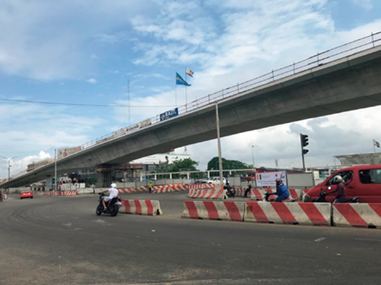
The Japan-Ivorian Friendship Intersection under construction (Photo: JICA)
Due to rapid population growth and concentration of major industries, the urban area of Abidjan, the city with the largest economy in Côte d’Ivoire, has expanded in a disorderly way, leading to chronic traffic congestion and other urban problems. In response, from February 2013 to November 2014, Japan implemented the “Project for the Development of Urban Master Plan in Greater Abidjan (SDUGA),” a technical cooperation project to assist in developing Abidjan as a sustainable city. The Urban Master Plan in Greater Abidjan formulated by the project indicates priority projects such as policies for appropriate urban utilization and an urban transportation design for 2030. In March 2016, the government of Côte d’Ivoire positioned the Urban Master Plan in Greater Abidjan as the official city plan for the country. The Plan has been highly valued not only by Côte d’Ivoire, but also other donor countries and international organizations. Various development donors, including the United States, France and the African Development Bank (AfDB) are implementing priority projects identified by the Plan.
Japan has since continued to provide assistance toward the realization of the Plan, and the “Project for Improvement of the Japan-Ivorian Friendship Intersection” is one of them. This grant aid project achieved the grade separation of the targeted intersection, which is located at a transportation hub that connects the airport, the port, and the business district. Full-scale construction began in 2017, and the first phase of construction completed by the end of 2019. Furthermore, in the second phase of construction, JICA plans to build a bidirectional flyover that will facilitate two-way traffic between the city center and the suburbs, allowing the passage of more vehicles.
By significantly reducing traffic congestion in Abidjan, the project is expected to strengthen the city’s role as a hub in West Africa and further increase its economic vitality.
- *New Approach for Peace and Stability in Africa (NAPSA)
- The new approach was advocated by Prime Minister Abe at TICAD7 held in Yokohama in August 2019. Based on the principles of respecting Africa’s ownership and taking measures against root causes of conflict and terrorism, Japan will support (1) Africa’s efforts to prevent, conciliate and mediate conflict by the African Union (AU) and regional economic communities (RECs), (2) institution building and enhancement of good governance, (3) prevention of youth radicalization and resilience of local community.
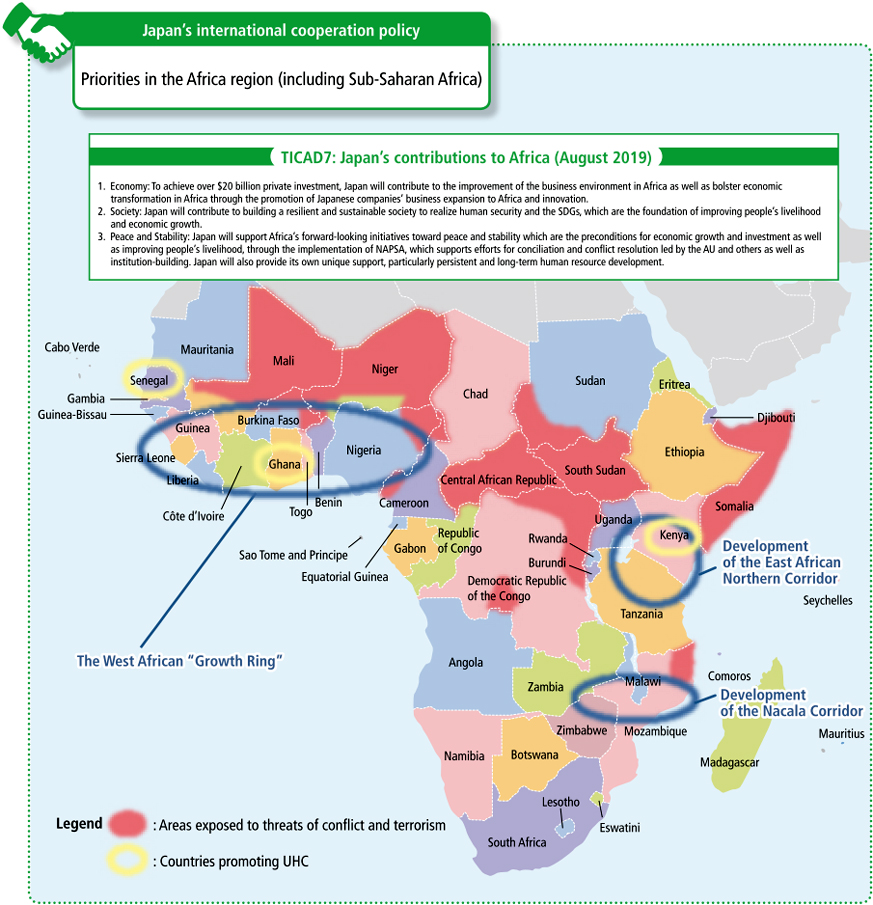
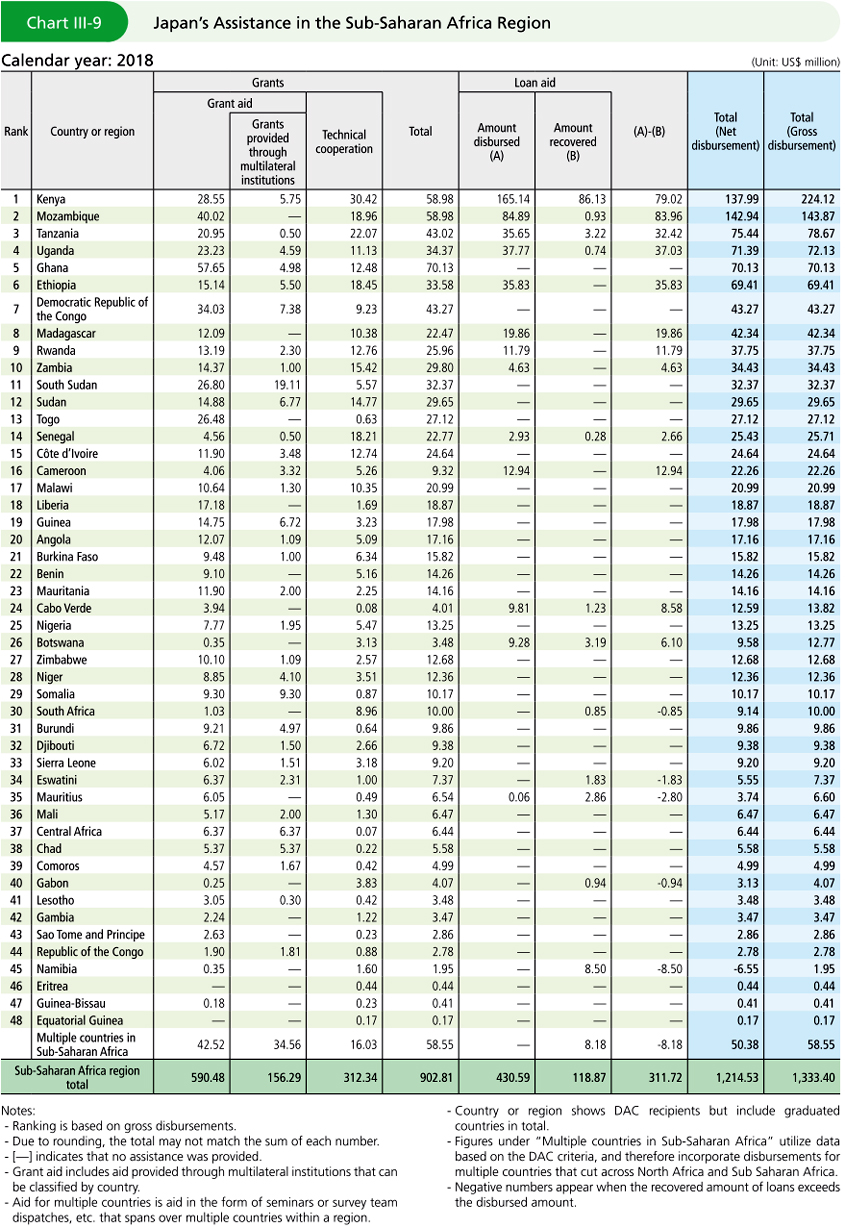
- Note 10: Three areas spanning the East Africa Northern Corridor, the Nacala Corridor, and the West Africa Growth Ring.
- Note 11: A group of the five countries of the Sahel region (Chad, Niger, Burkina Faso, Mali, and Mauritania). Its establishment was decided at the summit meeting of the five countries held in Nouakchott, Mauritania in February 2014.
